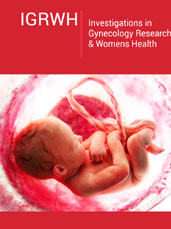- Submissions

Abstract
Investigations in Gynecology Research & Womens Health
Physical and Gynecological Outcomes among South African Women Survivors of Rape
-
Open or CloseTeri D. Davis, Ph.D.1*, Tamra Burns Loeb, Ph.D.2, Dorothy Chin, Ph.D.2, Nombulelo V. Sepeng, Ph.D3, Mashudu Davhana-Maselesele, Ph.D4, Jenny Park1, Muyu Zhang, M.S., M.A.2, Michele Cooley-Strickland, M.Ed.2 and Gail E. Wyatt, Ph.D2
1The Chicago School of Professional Psychology (Los Angeles Campus), Department of Clinical Psychology, USA
2Semel Institute, UCLA, Department of Psychiatry & Behavioral Sciences, USA
3Department of Nursing, School of Health Care Sciences; Faculty of Health Sciences, University of Pretoria, South Africa
4Rectorate; Walter Sisulu University, South Africa
*Corresponding author:Teri D Davis, Department of Clinical Psychology, USA
Submission: November 18, 2020Published: December 22, 2020

ISSN: 2577-2015Volume3 Issue5
Abstract
Introduction: South Africa has one of the highest rates of sexual violence against females in the world [1,2]. Residual outcomes among rape survivors in South Africa are complex, and include symptoms of depression, and post-traumatic stress (PTSS) [3,4] as well as physical and gynecological problems [5,6]. While South African rape survivors report physical and mental health symptoms [7]. We know little about the internal (i.e. self-management) and external (i.e. support from others) coping strategies that they use over time.
Objectives: This study conducted secondary analyses of South African female rape survivors who reported experiences of rape within six months of being interviewed and compared their physical and mental health, coping strategies, rape myths and social undermining of friends and families one year later. The goal is to foster a discussion of post-rape outcomes that may be utilized to develop recovery interventions for South African women rape survivors who may seek gynecological care and related health care services.
Method: Participants self-reported demographic data, physical health symptoms including gynecological symptoms (i.e. pain during sex), post-traumatic stress and depression, coping strategies, rape myths, and social undermining at baseline and 12-month follow up.
Results: Similar to the parent study (n=248), the present sample of women (n=77) were 18-50, on average 27 years of age, single (88%), unemployed (75%) and low-income with few resources, but were more educated. T tests and chi-square tests were performed to compare physical health symptoms, symptoms of post-traumatic stress and depression, coping styles, rape myths and social undermining at baseline and 12-month follow-up. High levels of post-traumatic stress and moderate levels of depression, overall physical symptoms, and specific gynecological complaints were maintained over time. Women increased their use of several personal coping strategies, and a decrease in emotional support. They reported an increase in social undermining from family and friends and endorsed more rape myths over the study period.
Conclusion: Gynecologists and other health providers treating South African women need to assess histories of nonconsensual sexual experiences (rape) and mental health issues when patients present with physical symptoms that may have been trauma-induced and refer them for more care. Although their use of coping strategies increased, women’s mental and physical health symptoms persisted over time. Rape survivors may have required more targeted support to cope with mental and physical health symptoms. Gynecological care and behavioral interventions tailored to address the sociocultural context in which these experiences occur are needed to mitigate the negative-and persistent-health consequences of rape and to increase their gynecological health.
Keywords: Rape; South Africa; Women; Physical symptoms; Gynecological symptoms; Post- traumatic stress symptoms
 a Creative Commons Attribution 4.0 International License. Based on a work at www.crimsonpublishers.com.
Best viewed in
a Creative Commons Attribution 4.0 International License. Based on a work at www.crimsonpublishers.com.
Best viewed in 







.jpg)






























 Editorial Board Registrations
Editorial Board Registrations Submit your Article
Submit your Article Refer a Friend
Refer a Friend Advertise With Us
Advertise With Us
.jpg)






.jpg)














.bmp)
.jpg)
.png)
.jpg)










.jpg)






.png)

.png)



.png)






